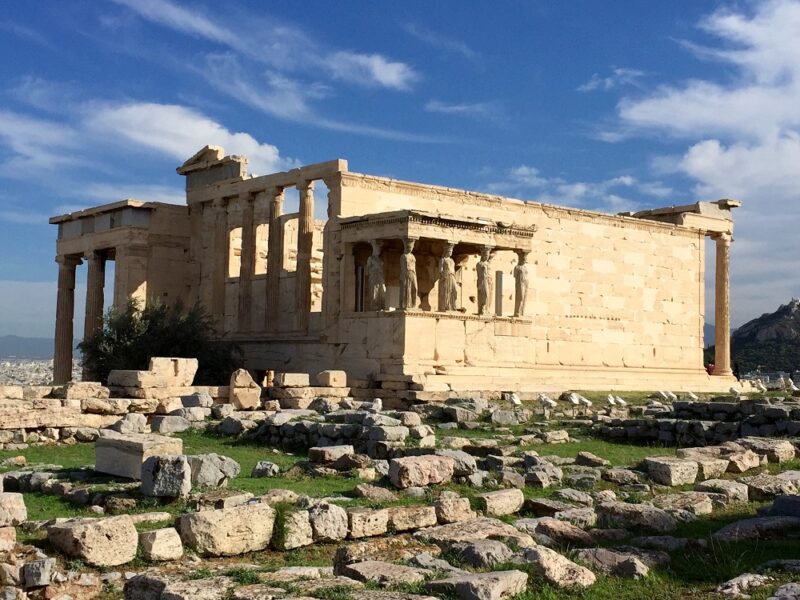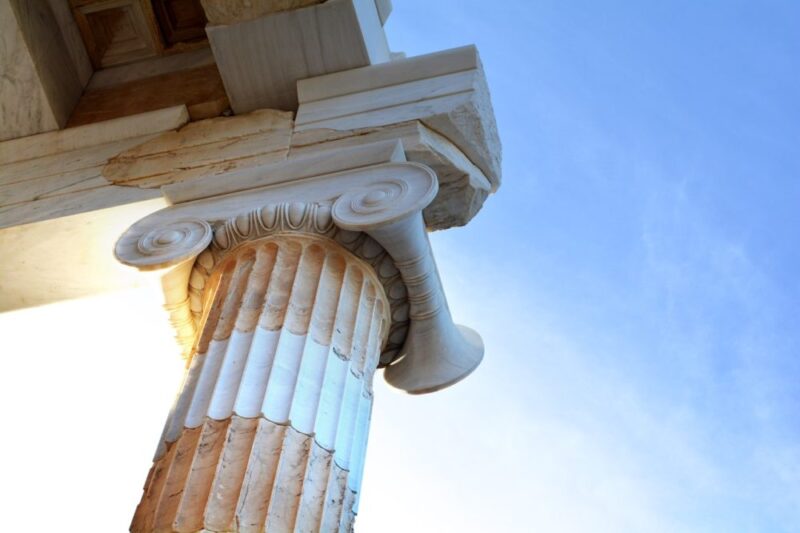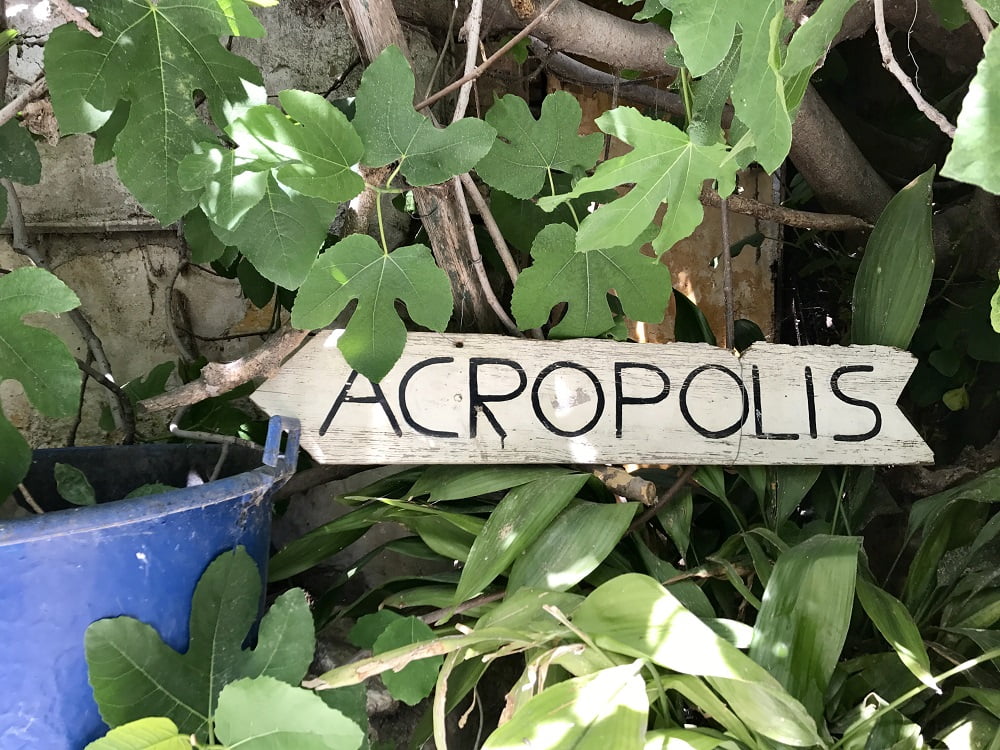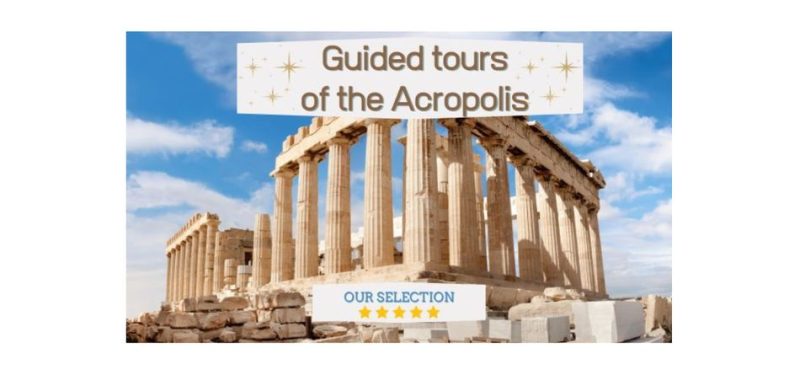The Acropolis of Athens and the Parthenon is undoubtedly the most visited site in Greece. This is one of the highlight on any visit to the Greek capital. A must-see!
The rock of the Acropolis and its monuments (including the famous Parthenon) form an extraordinary architectural and artistic ensemble bequeathed by ancient Greece to the rest of the world. Visiting the Acropolis isn’t just about admiring the famous Parthenon, the temple dedicated to Athena. You’ll also have access to the Theater of Dionysus, the Herod Atticus Odeon, the Portico of Eumenes, the Propylaea, the Temple of Athena Nike, the Erechtheion and more… These monuments have become a universal symbol of the classical spirit and civilization, and have been declared a UNESCO World Heritage Site.
We’ve made dozens of visits to this magnificent archaeological site, where the Parthenon temple is enthroned. It’s a must when family and friends come to visit! So, to help you make the most of your visit, we’ve put together a few practical tips. They are therefore drawn from our own experience. We hope you find them useful.
Where is the Athens Acropolis and how do I get there?
The main entrance to the Acropolis and its Parthenon is located on rue Dionysiou Areopagitou. There is also a second entrance, via the Theater of Dionysus (on the corner of Dionysiou Areopagitou and Thrasyllou streets, almost opposite the Acropolis Museum). We recommend this 2nd entrance, as it’s often less crowded. The Acropolis on Google Maps.
If you’re staying in downtown Athens, you can easily walk to the Acropolis. From Syntagma Square, it’s a fifteen-minute walk to the Acropolis. It’s a pleasant walk through the Plaka district, or along the National Garden to the Temple of Zeus. From Monastiraki square, it’s another 15 mins, either through Plaka or to the Areopagus.
If you’re taking the metro to the Acropolis and its Parthenon, stop at the “Acropoli station” (line 2, the red one). Follow the signs and you’ll easily find your way.
How to visit the Acropolis? Ticket prices and purchase
In order to preserve this Unesco World Heritage site, a quota of 20,000 people per day has been introduced. So you’ll need to buy your ticket in advance for the date and time you wish to visit. It is still possible to buy your tickets on site, but this does not guarantee that you will be able to visit the Acropolis and its Parthenon on the dates and at the times you wish, and especially with the people accompanying you…
To find out more, see also our articles :
Where to buy tickets for the Acropolis and Parthenon? :
- or at the on-site box office
- or via the official online booking site. The site can be used to print out full-price tickets, but you won’t be able to save yourself a trip to the ticket office for reduced-price and free admission tickets, as you’ll still need to show proof of entitlement. => Find out all about booking your tickets for the Acropolis and Parthenon online here.
- or on Civitatis: This site allows you to purchase a full-price ticket to book your entry to the Acropolis site. Non-refundable tickets.
- or on GetYourGuide website. The price is slightly higher, but this site has the advantage that the online booking is simple. Book tickets for the Acropolis and Parthenon on GetYourGuide.
You can choose either a single entry ticket or a combined ticket.
Single entry
Rates for the Acropolis, including the Parthenon and other monuments :
- The price is high: 30 euros full price.
- Reduced rate : 15 euros for European citizens over 65 from October 1 and May 31. Full price applied from June to September.
- Admission is free for under-25s living in an EU member state, up to 18 years old for non-EU citizens, for EU students with proof of enrolment, and for people with disabilities.
All prices in detail in our article All you need to know about prices at the Athens Acropolis.
Combined ticket Acropolis + 1 to 5 sites
Before April 1, 2025, there was a combined Acropolis + 6 sites ticket for €30, but this ticket no longer exists. There is now another combined ticket available on Get Your Guide. It allows you to visit the Acropolis and up to 5 archaeological sites in Athens in addition to the Acropolis (€30): the ancient Agora and its museum (€20), the Roman Agora (€10), the Temple of Zeus (€20), the Lyceum of Aristotle (€5) and the Panathenaic Stadium (€10).
Another combined ticket solution is the Athens City Pass, which allows you to visit the Acropolis and its Parthenon, the Acropolis Museum, the Museum of illusions… And the multi-stop tourist bus.
Is admission to the Acropolis Museum included in the Acropolis ticket?
The answer is NO. The Acropolis and the Acropolis Museum are 2 separate sites, despite being located in close proximity. If you buy a one-way ticket for the Acropolis, entry to the Acropolis Museum is not included. Unless you buy a combined Acropolis + Acropolis Museum ticket on the GetYourGuide website, or the Acropolis + Acropolis Museum ticket on Civitatis.
Tickets for the Acropolis Museum are available from the museum’s ticket office or via its electronic ticketing service .
Free access
Please note that access to the Acropolis is free on the following days:
- March 6 (in memory of Melina Mercouri)
- April 18 (International Monuments Day)
- May 18 (International Museum Day)
- the last weekend of September each year (European Heritage Days)
- October 28 (Ochi Day – Greek national holiday)
- every first and third Sunday of the month between November 1 and March 31.

Athens Acropolis opening times
For information, the Acropolis and Parthenon are open:
- winter: daily from 8am to 5pm
- summer: opens at 8am, closes between 5:30pm and 8pm depending on sunset.
The site may also be closed in the event of extreme heat or heavy rain. Furthermore, closing times vary according to the season (especially in September and October), so it’s best to check the official websites Hellenic Heritage or Odysseus Culture before your visit.
There are certain days when the Acropolis is closed:
- January 1st
- March 25
- May 1st
- Easter Sunday (note: the date to be taken into account is that of Orthodox Easter)
- December 25 and 26
Solutions for visiting the Acropolis and Parthenon in Athens
An English-speaking guide to the Acropolis?
To make the most of your visit, we strongly recommend that you hire the services of a guide. It changes everything!
1- If you would like a private tour of the Acropolis itself it’s best to be accompanied by a tour guide. Price: from €245 for your family/group for a 3 or 4 hours visit. We can suggest those visits:
- Private Tour with Ioanna for visiting Acropolis and Acropolis Museum (3 hours)
- Private Tour with Christos: Acropolis and Old Town (4 hours)
- or this Half-day Private City Tour: Acropolis, Acropolis Museum, Temple of Olympian Zeus, Panathenaic stadium, Plaka… (5 hours). Pickup from Athens or Pireas.
2- If you prefer a tour of the Acropolis in a small group then call Alternative Athens. The agency offers two formulas. A package with just the Acropolis site at 45€/adult and a more complete package with access to mythology at 65€/adult, in English. This tour takes in all the city’s landmarks. The must-see Acropolis and its world-famous Parthenon, the majestic Temple of Olympian Zeus, as well as the Ancient Agora. Tested and approved, we loved this visit! It’s lively and mythologically focused. Discover ancient sites through the legends of Greek gods and heroes. Click here to book (reduced rates for children).
Self-guided tour of the Acropolis
If you’re looking for a less expensive solution you can opt for these solutions:
- the Acropolis from a different angle, a ultra-complete guide, lively and inexpensive (e-book €10)
- Or a 3D tour of the Acropolis on smartphone.
If you want to visit the Acropolis with an audioguide, we’ve spotted these 2 english audioguides included with the entrance tickets. Be sure to take the option with the Acropolis audioguide (and not just the city audioguide) : Clio Muse – Key Tour.
Visiting the Acropolis and Parthenon with children
If you’re traveling with children, equip them with sneakers and light clothing. Bring a drink and a snack (no catering is provided inside the site).
For the little ones, you won’t be able to use a stroller. Don’t forget a baby carrier.
Having children of our own, we know that it’s not always easy to get them to visit ancient sites. However, children love mythology, and a visit to the Acropolis can be a fascinating experience for children and teenagers alike, if the conditions are right. In our experience, we have plenty of solutions for families who want to visit the Acropolis in a fun way with children.
- A family Mythology Tour with Alternative Athens. Visit the highlights sites of Athens in little group of 14 and learn about Greek Gods and heroes !
- smartphone application to see the Acropolis in 3D as it was in its heyday
- an electric bike tour for family, a bike tour of Athens that combines the city’s ancient and modern sites
- a Segway ride to see the must-see sites of Athens (possible to include a visit to the Acropolis on foot)
Practical tips for visiting the Acropolis and Parthenon
When is the best time to visit the Athens Acropolis?
The best advice we can give you, if you choose to visit in the morning, is to arrive early (really really early) to avoid the crowds and take full advantage of the site. If you can, try to be there at the opening. Bear in mind that this is Greece’s most visited archaeological site, so you won’t be the only one trying to avoid the crowds. Thousands of people go there every day to visit its famous temple, the Parthenon. Arriving when the site opens allows you to avoid both cruise passengers and the high temperatures of the summer months.
Personally, our favorite option is to visit the Acropolis in the late afternoon. Afternoons are generally less crowded than mornings. In addition, temperatures are lower and the light pleasant. We like this solution. So go 1h30 to 2h before the site closes.
Ideally, you should also visit the Acropolis Museum. In fact, it gives you a better understanding of the site. So don’t hesitate to buy a combined Acropolis + Museum ticket.

Things to remember before visiting the Acropolis
- Remember to take water with you (you won’t find a periptero to buy it inside the site).
- Beware of the heat: it can be extremely hot on the Acropolis (much hotter than in downtown Athens) and there’s no shade. We therefore advise you to wear light clothing, sunglasses, a hat and sunscreen.
- Make sure your shoes are comfortable and don’t slip. You have to climb to reach the Parthenon, and some of the stones are very slippery. Avoid flip-flops and heels.
- Don’t be overloaded. Indeed, visitors are only allowed to enter the archaeological site with small backpacks or handbags.
- Also, don’t forget your proof of entitlement to reduced fares.
Disabled access and reduced mobility
The Acropolis and Parthenon site is also partially accessible to disabled and reduced-mobility visitors. This map shows the entrance and wheelchair-accessible areas (source: The Heart of Ancient Athens).
An elevator is available for wheelchairs, people with reduced mobility, and single parents with 2 or more children. The elevator is about 350 meters from the main entrance to the site (street Rovertou Galli).
Anyone wishing to use the elevator should call these numbers in advance: +30 210 321 4172, +30 210 923 8470 for details and access conditions.
Enjoy your visit!
Laure M.
If you wish to contact the Athens Acropolis archaeological site directly: Tel +30 210 321 4172 / Mail: efaath@culture.gr / Website





Mattiew
Very useful article!